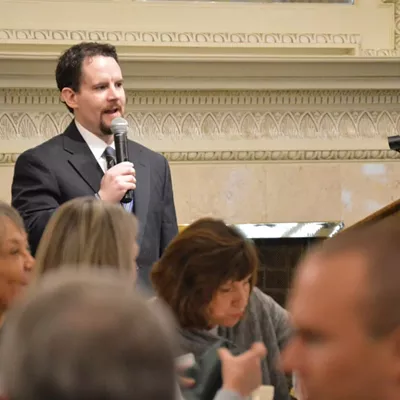

ELECTION 2017: Spokane Valley City Council
In more ways than one, the five Spokane Valley City Council races this year have roots in a decision the council made more than a year and a half ago: its controversial ousting of City Manager Mike Jackson.
At the time, citizens and other councilmembers accused the council majority of violating the state's open public meetings laws by conspiring to fire Jackson, or at least lacking transparency. (The state auditor's office later cleared the council of wrongdoing.) It prompted a critical response from the community, and led to two councilmembers — Dean Grafos and Chuck Hafner — resigning out of frustration. A third, Bill Gothmann, left the council around the same time for other reasons.
Their departures left room for the council to appoint MIKE MUNCH, CALEB COLLIER and PAM HALEY. All three are running to keep their seats this year, joining incumbents ROD HIGGINS, also the mayor, and ED PACE, an outspoken constitutionalist and libertarian. The four councilmembers who voted to oust Jackson were already considered to be a far-right majority, and with the appointments of Munch and Collier, who share Pace's political leanings, that's only been reinforced.
Last year, members pushed a proposal to proclaim the Valley a "Second Amendment sanctuary city." Months ago, Pace proposed an ordinance that would restrict schools and health agencies from making decisions about student vaccinations, school curricula and gender-neutral bathrooms — with support from Munch and Collier. Recently on Facebook, Pace has stated he will propose a Spokane Valley resolution supporting a 51st state — an idea pushed by right-wing Spokane Valley Rep. Matt Shea.
The five challengers feel the council spends too much time on issues that are out of its control. They want to change the balance of power and bring more moderate voices to the council.
BEN WICK, a former councilman who narrowly lost his seat in 2015, is challenging Pace. CHRIS JACKSON, an adjunct lecturer at Spokane Falls Community College, wants to unseat Higgins. BRANDI PEETZ, a member of the Spokane County Sheriff's Citizen's Advisory Board, is challenging Collier. LINDA (HATCHER) THOMPSON, director of the Greater Spokane Substance Abuse Council, faces Munch. And ANGIE BEEM, who organized the Spokane Women's March, faces off against Haley, a moderate conservative.
"I think there's a movement to get some diversity on council," Wick says.
At stake is the future of the Valley when it comes to development, public safety and infrastructure.
CITY GROWTH AND DEVELOPMENT
As Spokane Valley continues to expand, it's starting to experience some growing pains. Candidates uniformly have said they're hearing concerns from residents who don't want to see their neighborhoods impacted by density, particularly large apartment complexes.
Jackson, challenging Higgins, takes issue with what he sees as the council's policy of "anything goes." Jackson says more impact fees should be discussed.
"If things move in unfettered, it upsets people in that area," Jackson says. "There should be some regulation."
Wick says he will fight for neighborhood preservation. He says the Valley should examine the Comprehensive Plan to ensure that high-density development doesn't change the character of neighborhoods.
Peetz says the Valley will need to better prepare for growth.
"We definitely have to accommodate the people moving to our city, we just have to do it responsibly," she says.
Current councilmembers, however, say some of the issues with zoning have been addressed in the Comprehensive Plan. They note that some of the larger apartment complexes that Valley residents have had concerns with actually are just outside of city limits. The Comprehensive Plan was recently rewritten. Included in that was language that made sure multi-family developments were not zoned for the middle of residential areas, Pace says.
"We have a goal of preserving the quality of residential neighborhoods," he says. "But I understand the anxiety, because they see all these big complexes going up."
PUBLIC SAFETY ISSUES
After Jackson was forced out as city manager in February 2016, critics of the council majority suggested the ouster may have been influenced by the council's desire to create a new police department, rather than contract with the Spokane County Sheriff's Office for police services.
But doing so would cost the city millions of dollars. Instead, this year, the Valley renewed its contract with the Sheriff's Office after negotiating in some cosmetic changes, like adding a Spokane Valley Police logo to more cars.
Now, the focus for current councilmembers is adding more deputies in the Valley. That's a challenge, because the Sheriff's Office is having trouble recruiting deputies to fill open positions.
The city currently has a $3 million surplus. Current councilmembers Pace, Munch, Collier and Haley say they're focusing on using some of that money to use to recruit more deputies. They hope the Valley may be able to offer sign-on or retention bonuses.
"We're not getting the officers we're contracted for," Munch says.
Mayor Higgins, however, doubts that "sweetening the pot" will be possible, due to the nature of the contract with the Sheriff's Office. He'd rather put that surplus money elsewhere.
"We just completed a five-year deal with the Sheriff's Department, so that's pretty well put to bed," he says. "And with that is the campaign rhetoric that we want our own police department."
Peetz, Collier's opponent, touts her experience as someone with a criminal justice degree and a member of the Sheriff's Citizen Advisory Board. She says she would not be a proponent of the Valley starting its own police force.
"I have the resources and the knowledge, where Caleb [Collier] and other councilmembers do not," she says.
Moving forward, Peetz says public safety is her No. 1 priority. She says she will make sure that law enforcement is adequately funded if elected. She still insists that current councilmembers want their own police force, but aren't bringing it up publicly.
Beem says, after speaking with Spokane Valley Police Chief Mark Werner, that one of the biggest issues he's facing is drug abuse leading to people moving in and out of jail. She says she would push ordinances that would allow officers to go to nuisance properties and clean things up, to "nip things in the bud before they get bad."
INFRASTRUCTURE QUESTIONS
With a surplus, just about every candidate agrees that the majority of the extra money should go into roads and infrastructure. The difference between the candidates, however, lies in whether that means prioritizing road projects or road maintenance.
Wick argues that the city is not funding road maintenance for concerns like potholes as much as it should be. He says studies have shown that every dollar spent on road maintenance can save the city up to $8 in the future that would have been spent on rebuilding.
Current councilmembers, however, seem more interested in capital projects like bridging the Valley. Higgins says that Barker, Pines and Park roads are all in need of rail crossings, with the first priority being Barker.
Councilmembers say they're waiting to see estimates from the city's public works department regarding street preservation. But Collier says that overall, the Valley's streets aren't that bad. If you don't believe him, he says, drive to the city of Spokane.
"Compared to Spokane, our streets are pretty nice," he says.
Thompson, challenging Munch, says the Valley needs to invest both in road preservation and capital projects. She says she would use her connections at the state and federal level, which she's developed through her work running a nonprofit, to advocate for grants that could help with road projects.
A NEW DIRECTION?
Pace, Collier and Munch have taken criticism lately for their support of an idea to allow parents, not schools or health organizations, to decide when unvaccinated students should go to school during a disease outbreak.
Even Haley and Higgins are skeptical of that idea. Higgins says that "parental rights are important," but doesn't agree with the manner in which Pace has pursued it, with an ordinance. Haley says she is "completely opposed to it," mainly because it's outside of the purview of the city of Spokane Valley.
While Pace argues that protecting the rights of parents to decide if their unvaccinated kids can go to school is part of his duty to uphold the Constitution, most of the challengers agree that the issue shouldn't be dealt with at a city level. But out of Wick, Peetz and Thompson — the challengers to the councilmembers supporting the "parental rights" proposal — only Thompson goes as far as to express opposition to the substance of the proposal itself.
"I support the public health officers and schools and how they will implement that decision," she says.
The city council challengers may think more diversity of thought is needed, but Pace claims such diversity already exists. Three councilmembers, he says, are libertarian-leaning constitutionalists: himself, Munch and Collier. The others, he says, are more traditional conservatives. Pace says with the city's budget in a surplus, voters should keep all five current councilmembers.
"I hope people will see," he says, "that keeping all five of us is in the best interest of the city." ♦





















